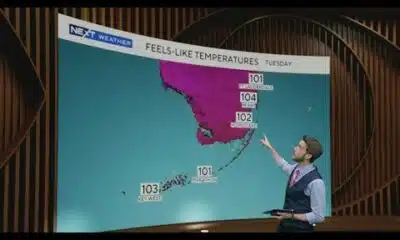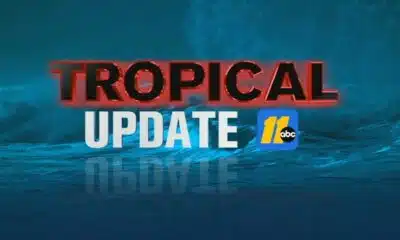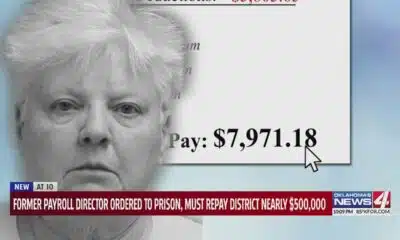News from the South - North Carolina News Feed
When will I get my first water bill? And how will that work, since we had no potable water for six weeks? When will lead tests go out? Raw water test results MIA? • Asheville Watchdog
Today’s round of questions, my smart-aleck replies, and the real answers:
Question: Can you let us know when the city of Asheville will begin to charge us for water?
My answer: Leaded or unleaded? Too soon?
Real answer: I’ve had several readers ask about this, and happily, Asheville Water Resources Department spokesperson Clay Chandler addressed this in detail at the Dec. 2 daily Helene briefing, and in a followup email.
First, Chandler noted that Water Resources paused all billing at the onset of Tropical Storm Helene, which struck Sept. 27, and did not resume until the city returned to providing potable water Nov. 18, when it lifted its boil water notice.
“As we return to regular service operations, billing will be resumed,” Chandler said. “Meter reading began the same week potable water was restored. I think our meter shop actually started to get out into the field on Nov. 20 — so a couple of days after the notice was lifted.”
Chandler said Thursday the first full batch of bills went out Dec. 2, “so they should start hitting mailboxes, if they haven’t already.”
At the briefing he noted a couple of key takeaways for customers to be aware of regarding bills.
As new billing statements go out, they’ll include service fees “for water, sewer, storm water and sanitation services, as applicable to each customer,” Chandler said.
“Utility flat fee charges are primarily billed bimonthly for a total of six times per year,” Chandler explained. “The water consumption charge for water usage on all bills has been changed to $0. This covers all water usage from your last bill before the storm through your meter reading for the current bill.”
That covers the full period when customers did not have potable water.
“Sewer treatment will be charged at the regular rate, as the Metropolitan Sewer District has remained operational and is treating wastewater on a normal schedule,” Chandler said.
Look for the overall bill to be higher than what you’re used to.
“Due to the lapse in billing during storm recovery, customers have missed one full bimonthly billing cycle,” Chandler said. “Because of this, the flat fees for services will be doubled on your most recent bill. Those fees are designed for assessment, six times per year for each of the services. And again, that’s water, sewer, storm water and sanitation.”
“What it does not include, again, is a water consumption charge for the billing period impacted by Hurricane Helene, from the end of September through mid-November,” he continued.
MSD General Manager Tom Hartye said this week via email that the district is aware that some customers have concerns about receiving high sewer bills for their most recent water and sewer utility invoice.
“The City of Asheville chose to delay billing during the aftermath of Tropical Storm Helene,” Hartye said, noting that current bills have an increased number of days in the billing cycle. “Some bills have up to 80 percent more days, as compared to the normal 60-day billing cycle.”
Hartye also noted that MSD operated throughout the storm.
“When non-potable water was delivered to the Asheville customers, the meters began to record the usage,” Hartye said. “While most of this water likely went down the sewer, we understand that some may have aggressively flushed outdoors to aid in the cleaning of the Asheville system.”
If you believe your billed water usage is abnormally high as a result of extensive flushing outside, contact Ben Colburn, MSD’s billing and collection coordinator, at 828-225-8209.
“MSD will offer a one-time credit for any usage over a 12-month bimonthly average,” Hartye said.
Chandler said Water Resources “will not assess any delinquent fees for utility statements until after March 1 next year.”
If you have billing questions or you need additional time to pay, contact the Water Resources Customer Service line at 828-251-1122.
“Payment plans, as always, will be made available to customers who request them, and the regular rates will resume, beginning with the next billing cycle,” Chandler said.


Question: I was wondering if you could maybe track down an answer to a question about water bills during the period without potable water. Water Resources spokesperson Clay Chandler in his updates seemed to suggest that there would be no water bills issued until full service was restored, so not to worry about consumption, all the “flushing” of lines, etc. However, I own an office space in a condominium where water use is charged on a prorated basis. Our association management has reached out to the city and was told that, yes, there is no billing happening now, but then once service is restored they will calculate the difference between the reading upon restoration and the last pre-Helene reading and issue a bill for water usage, and that it could be a very large bill. These two seem contradictory, to say the least. Could you investigate?
My answer: If by “investigate” you mean, “Ask Chandler about this,” then yes, by all means.
Real answer: Chandler said the entire bill cycle will be at a “zero rate for consumption.” The city has to read all the meters in the system, so that’s going to take some time.
“We won’t know in most cases what a customer’s meter was reading on Nov. 18,” Chandler said, referring to the date when potable water was restored. “Because of that, there will be no charge from the last reading until the current one. The ending read date will vary. We realize this will make some customers have a longer ‘free’ period than others, but that’s unavoidable.”
The city is working on installing new “Advanced Metering Infrastructure,” and that system, which includes automated readings, would have made all of this much simpler, Chandler said.
“That project, which is about 30 percent complete, will resume in January and is scheduled for substantial completion in 2026,” he added.

Question: I haven’t been able to find out when the lead kits that one can order from the city of Asheville Water Resources will be distributed. And, will they be sent by mail or require pickup at an office? I have submitted the same question to the city but would be most appreciative if you are able to find that information and distribute it through your posts.
My answer: It’s hard to say no when someone is this polite.
Real answer: “Lead kits will be distributed by Water Resources personnel or other city staff,” Chandler said. “Please note, due to the volume of requests, it could take a few weeks to get test kits distributed after the request is made. We’re working on ways to speed up that process and will share details once those plans have been finalized.”
As of last week, the city had received more than 5,000 requests for the kits. In mid-November, Water Resources announced that lead had been found in seven schools after the city had suspended its lead mitigation program for 19 days because of the storm damage. The mitigation program resumed Oct. 30, and the city says the water is safe to drink.
However, two outside chemistry experts recently told Asheville Watchdog that they would recommend people living in houses built in or before 1988, when lead was banned in plumbing, get their water tested for lead before consuming it.

Question: Why hasn’t raw water sampling data been posted for over a week? It’s still interesting to some of us.
My answer: We probably all need some new hobbies these days.
Real answer: “Raw water analysis, now that the boil water notice has been lifted, is done weekly, instead of daily,” Chandler said.
The city is posting those results on its website.
Asheville Watchdog is a nonprofit news team producing stories that matter to Asheville and Buncombe County. Got a question? Send it to John Boyle at jboyle@avlwatchdog.org or 828-337-0941. His Answer Man columns appear each Tuesday and Friday. The Watchdog’s reporting is made possible by donations from the community. To show your support for this vital public service go to avlwatchdog.org/support-our-publication/.
Related
The post When will I get my first water bill? And how will that work, since we had no potable water for six weeks? When will lead tests go out? Raw water test results MIA? • Asheville Watchdog appeared first on avlwatchdog.org
News from the South - North Carolina News Feed
In Depth with Dan: Answering viewer questions about flesh-eating bacteria, digital licenses
SUMMARY: In this Monday mailbag, Dan addresses viewer questions on three topics. First, North Carolina’s Vibrio bacteria risk in summer coastal waters: cooked shellfish is safe, but raw consumption is risky due to bacteria concentrating in oysters. Second, digital driver’s licenses in North Carolina face delays; although legalized in 2023, full rollout may not occur until 2026, with other states also lagging behind. Lastly, Dan explains flood-damaged vehicles after recent storms: flooded cars must be branded as such, but scams occur. He shares tips to spot flood damage when buying used cars, emphasizing caution and thorough inspection.
WRAL anchor/reporter Dan Haggerty answered viewer questions about a flesh-eating bacteria in North Carolina and the legalization of digital driver’s licenses.
News from the South - North Carolina News Feed
The latest update on Tropical Storm Erin
SUMMARY: Tropical Storm Erin is forecast to become a Category 1 hurricane by Thursday and remain well out to sea through Saturday, near the Lesser Antilles northeast of Puerto Rico. Models show it moving west, then curving north toward Bermuda or Florida, but uncertainty remains high beyond next week. The American and European models suggest it could pass between Bermuda and Hatteras, causing higher surf midweek. Due to large forecast errors, the storm’s exact path is unclear, ranging from north of New York to the Florida panhandle. Residents should prepare hurricane kits and stay updated, with clearer guidance expected by Thursday or Friday.
Will Erin cause problems for the East Coast? Here’s the latest on Monday evening.
https://abc11.com/post/tracking-tropics-tropical-storm-erin-forms-eastern-tropical-atlantic-cabo-verde-islands/17499988/
Download: https://abc11.com/apps/
Like us on Facebook: https://www.facebook.com/ABC11/
Instagram: https://www.instagram.com/abc11_wtvd/
Threads: https://www.threads.net/@abc11_wtvd
TIKTOK: https://www.tiktok.com/@abc11_eyewitnessnews
X: https://x.com/ABC11_WTVD
News from the South - North Carolina News Feed
Body of missing NC teen found in Florida, family says
SUMMARY: The body of missing North Carolina teen Gio Gio was found in Bradenton, Florida, confirmed by his family. Originally, Gio Gio was supposed to be picked up by relatives after meeting cousins in Florida, but he disappeared after texting his mother for help. His family’s private investigators, not the police, discovered his body near I-75 after police had initially searched the area. Gio Gio’s mother expressed her heartbreak on Facebook, calling it every parent’s worst nightmare. The investigation continues, focusing on the timeline after Gio Gio entered the car with his cousins. An autopsy is pending, with no immediate signs of foul play.
The body of Giovanni Pelletier was found in a retention pond, authorities said, and his mom is living “every parent’s worst nightmare.”
https://abc11.com/post/giovanni-pelletier-body-missing-18-year-old-north-carolina-found-pond-where-last-seen-family-says/17483056/
Download: https://abc11.com/apps/
Like us on Facebook: https://www.facebook.com/ABC11/
Instagram: https://www.instagram.com/abc11_wtvd/
Threads: https://www.threads.net/@abc11_wtvd
TIKTOK: https://www.tiktok.com/@abc11_eyewitnessnews
X: https://x.com/ABC11_WTVD
-
News from the South - Oklahoma News Feed2 days ago
Former payroll director ordered to prison, must repay district nearly $500,000
-
News from the South - North Carolina News Feed6 days ago
Two people unaccounted for in Spring Lake after flash flooding
-
Mississippi Today7 days ago
Brain drain: Mother understands her daughters’ decisions to leave Mississippi
-
News from the South - Texas News Feed3 days ago
Jim Lovell, Apollo 13 moon mission leader, dies at 97
-
News from the South - Tennessee News Feed5 days ago
Trump’s new tariffs take effect. Here’s how Tennesseans could be impacted
-
Mississippi News Video7 days ago
Great American Farmers Market
-
News from the South - Florida News Feed7 days ago
SCOTUS order in Louisiana case could affect Alabama redistricting battle
-
News from the South - Missouri News Feed4 days ago
Man accused of running over Kansas City teacher with car before shooting, killing her









































